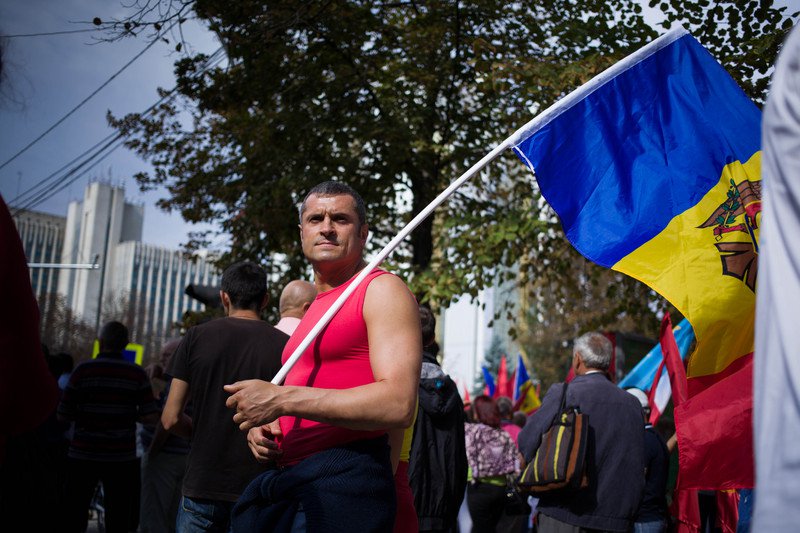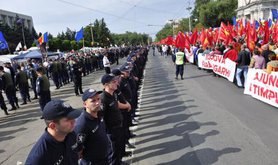Moldova's image in European media carries an aura of geopolitical suspense—a faceless country described either as 'a territory sandwiched between Romania and Ukraine', the 'poorest country of Europe', or a vital source of migrants, sex workers and illegal organ transplants. Often, Moldova is painted in khaki by drawing attention to the frozen conflict in neighbouring Transnistria.
Everything changed dramatically after $1 billion disappeared from three of the country’s banks at the end of last year. Reports about Moldova in the European media in 2015 focused much more on 'Moldova's endemic corruption' rather than mass migration and Transnistria. An August 2015 article by Thorbjørn Jagland, secretary general of the Council of Europe, added fuel to the fire by calling on Europe to 'Bring Moldova back from the brink'.

Jagland made reference to the stolen billion and highlighted that Moldova is a territory where the interests of EU and Russia meet each other. 'Neither [Russia nor the EU] will benefit from a weak neighbor that brings with it financial black holes, organized crime, trafficking and uncontrolled migration,' Jagland wrote. The 'neighbour' in question was Moldova. Jagland called the country a 'captured state' and urged its citizens to return the country to their control. Protester in Chișinău, 27 September 2015. Photo: (c) Julia Udovitsina/DemotixAfter Jagland's article, 'captured state' and 'one stolen billion' became the new media catchphrases to describe Moldova. However, this tendency did not make the new reports on Moldova any more in-depth.
After mass protests started on 6 September in the centre of the country's capital Chișinău, articles calling these events the 'one billion protests' began to appear en masse. Even though the leaders of the protest from the civic platform Dignity and Truth never proclaimed their protest as an action to recover the stolen billion, describing it as a protest against the corrupted system as a whole. #Onebillionprotest became one of the most popular hashtags to refer to the events on social media..
Looking into the media mirror
'As I see it, Moldova is not often mentioned in European media. An exception is made when a Moldovan citizen is involved in a criminal case.' says Marina Zabughina, a 25 year-old graphic designer from Moldova. 'I would say that there is not enough attention to Moldova. One thinks that lots of people are not aware of Moldova as a country, since it is often deemed to be a region of Romania or Russia.' Zabughina left Moldova in September 2015 and currently lives in Helsinki.
Marina thinks that the economic and historical background of Moldova should be more frequently covered to raise awareness of the reasons that lead so many people to emigrate. For Marina, the media coverage of Moldova is superficial even when it comes to such widely-known topics as Transnistria. 'I know students who have written their master thesis on this subject but I don’t see journalists explaining to common people what happened and what is happening on the right side of the Dniester river', Marina says.
There are several views on the issue. 24-year old Ecaterina Crasilova, is marketing director of one of the fanciest restaurants in Chișinău. Ecaterina believes that European media did display some tinterest in Moldova over the last six years, caused by the process of European integration and development of the Eastern Partnership in which Moldova played an important role. At the same time, she says that human interest stories from Moldova were lacking in this discourse.
Diana Stefirta, a radio journalist, is head of the Center of Young Journalists of Moldova, and she feels that the country is portrayed in European media as one begging for financial help from EU or is in the process of expecting it. While Diana finds lots of critical articles about the state of the Moldovan political system, Diana believes that Moldova should be defined not only by its internal politics and international relations.
How should Moldova be portrayed in international media then? 'I don’t have a proper answer for your question,' admits Zabughina, 'because I don’t see a solution that doesn’t involve a radical change in Moldovan society. She hopes that the way European journalists report on Moldova will develop as a natural consequence of the change of the country itself. As a professional journalist herself, Diana says that the key is the editorial policy of the media company in question, and the personal interest of a reporter in what is actually happening in Moldova.
As far as reporters are concerned, Crasilova is more radical. Ecaterina believes stories about Moldova which are closer to its daily realities can only be written by journalists who have lived in the country for at least for five years.
The Moldovan Diaries
Luckily, there are reporters whose personal and professional interest in Moldova is less limited. At the beginning of September—six weeks before mainstream international media remembered about Moldova following the arrest of the country's former prime minister—a new multimedia documentary project was announced.
'The Moldovan Diaries', created by Paolo Paterlini and Cesare De Giglio, differs from what has been done before by European media professionals. Paterlini is currently studying for a Master's degree in Advanced Migration Studies at the University of Copenhagen, while De Giglio is a reportage photographer based in London.
In 'The Moldovan Diaries', Moldova is described as a 'unique region of Europe, where a distinctive geopolitical history is equally a bridge between the European Union and Russia, and a cause of disagreement in society.' Geopolitics is just one angle through which the project looks at Moldovan society.
'The Moldovan Diaries' is a multimedia project that allows readers to travel across an interactive map of Moldova. Stories collected in different regions of the country are told through photo essays, text or video interviews. It pays special attention to Gagauzia, an autonomous region of Moldova, and the country's Roma community. The Moldovan Diaries opens the hidden pages of Moldovan history, such as the tragedy of Albota de Sus, a Bessarabian German Village in Moldova whose inhabitants were deported to Siberia after the Second World War.
'We decided to create this project when we realised that there was a lack of comprehensive documentary work about the Republic of Moldova', says Paterlini. 'During the last few years, there have been several interesting works of reportage coming out of the country, mostly covering single issues such as migration, human trafficking, the EU-Russia dualism, and the situation in Transnistria.'
Most Moldovans recall another feeling when reading foreign stories about their country – shame.
Their goal was different. 'We tried to build a network of stories, connected by one question, instead of a linear narrative: what does it mean to be a Moldovan citizen today, in an era of massive migration and geopolitical tensions, in a multilingual society at a critical point of its history?' continues Paterlini. 'One of the main reasons for Moldova's absence in media is because people, especially in the west, simply do not know where Moldova is.'
Paolo and Cesare first visited Moldova for a week in 2012, long before starting this new project. Yet that journey greatly influenced them in the shaping ideas that led to the 'Diaries'. Overall, they worked for two months in the country, making a number of visits between January and September 2014, relying on a network of friends and colleagues across the country. The project was possible thanks to a successful Kickstarter campaign that Paolo and Cesare launched last summer.
'The Moldovan Diaries' has raised interest not only among foreigners but also Moldovans, some of whom admitted that they even felt proud when watching the personal stories shown in the project. Most Moldovans recall another feeling when reading foreign stories about their country – shame.
Zabughina says that when she first discovered the project she was both surprised and proud. 'I was curious to see the results. By telling the story of people with radically different backgrounds the authors show a multifaceted Moldova,' she says. 'It is really a way to tell our Moldavian realities, stories of humans and their lives. I was interested to read the articles and watch their videos. I believe in the enthusiasm of the team and the novelty of the idea and project', adds Stefirta. ' It's inspiring,' says Crasilova.
Paterlini and Di Giglio wanted to raise curiosity about a corner of Europe with a complex and often forgotten history through a multimedia platform. 'A web-documentary is a versatile tool, that can be used both for traditional reportage and classic documentary. And seeing so many people going through the stories we gathered is truly rewarding,' adds Paterlini.
Giving Moldova a brand
Similar projects are on the horizon. Andrea Diefenbach, who works in the sphere of documentary photography, has only just started her new project about Moldova. The 'Country without Parents' exhibition opened in on 26 October in Chișinău, telling the story of children whose parents have migrated. Her photos were published in Germany in 2012 in a book of the same name. Next year, this exhibition about the tragedy of Moldovan migration will be on display in the USA.
'I came to Moldova for the first time at 2008 for an assignment,' says Andrea. 'I had to take photos for a German magazine about human trafficking. Since than Moldova has changed a lot.'
Moldovans obviously aren't happy about the way their country has been portrayed in international media. However, 'you do not have to blame God if you yourself are the fool,' as the saying goes. Asking the right questions of our society and its direction would be an important step towards improving Moldova's image.
If you enjoyed this article, please consider following oDR on Facebook or Twitter.
Read more
Get our weekly email



Comments
We encourage anyone to comment, please consult the oD commenting guidelines if you have any questions.